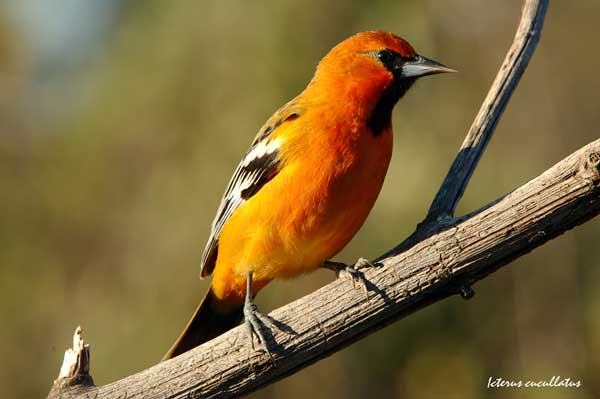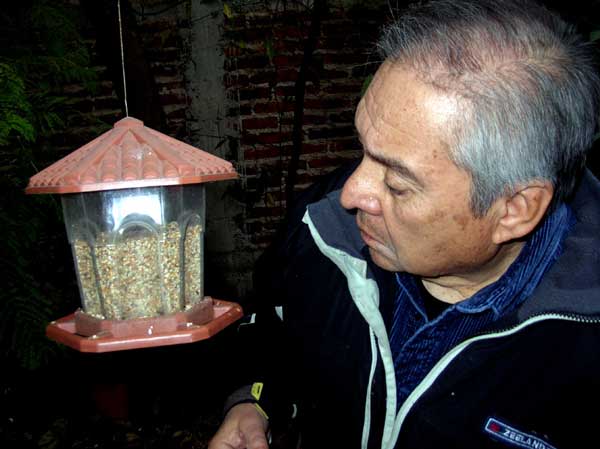 “I
have been feeding the birds here in Pinar de la Venta (a suburb of
Guadalajara, Mexico) for forty years,” says
Professor Santiago Gómez, “and never have I seen anything like what is
happening now. I used to refill six large feeders with birdseed every day.
Hundreds of birds used to come all year round, all four seasons. Now there
isn’t a one.”
“I
have been feeding the birds here in Pinar de la Venta (a suburb of
Guadalajara, Mexico) for forty years,” says
Professor Santiago Gómez, “and never have I seen anything like what is
happening now. I used to refill six large feeders with birdseed every day.
Hundreds of birds used to come all year round, all four seasons. Now there
isn’t a one.”
This complaint is echoed by Pinar resident Susy Pint. “Every November, when
our loquats ripen, flocks of orioles, kiskadees) and a variety of more
exotic birds used to come to our tree. This is the first year not a single
bird has appeared.”
What has happened to the birds? The problem is anything but a local one. In
an article in Stanford Magazine, naturalist Peter Steinhand claims around
one-third of America’s 836 bird species are in “statistically significant
decline,” and scientists at the University of Sheffield in England say the
din of lawn mowers, leaf blowers and other machines could be the cause.
Edgers, Whackers and Blowers Everywhere
Recently, the noise level in Pinar de la Venta, located ten kilometers west
of Guadalajara, has shot up dramatically. The main culprit is the leaf
blower. This Japanese invention was completely unknown before the 1970’s but
today it is sold all over the world. Gardeners who previously used clippers,
rakes and brooms now employ lawn mowers, edgers, weed whackers and the
deafening leaf blower, all in the course of the same day. “It is difficult
to find a single spot in Pinar de la Venta which is not within 100 meters of
a frequently used leaf blower,” states a local gardener.
Whereas leaf blowers are used only two or three times a year in some
countries (for very big jobs), Mexican gardeners tend to employ these loud
machines several times a week to keep driveways and lawns and even roofs
immaculately clean.
Curiously, while these machines are gaining in popularity in Mexico, they
are being outlawed in many other places. More than 200 US and Canadian
cities—including Los Angeles and Vancouver—have banned gas-powered leaf
blowers, calling them a public-health hazard. They cite the machine’s
extremely bad emissions, pointing out that operating a leaf blower for only
one-half hour produces pollutants equivalent to driving a car 12,392
kilometers, the equivalent of three road trips from Tijuana to Mérida.
Excrement in the Air
To make things worse, a leaf blower raises dust containing mold spores,
pollen, pesticide residues and tiny particles of break linings, asbestos,
dog excrement and even rodent feces (which have been proven to cause viral
disease and death). All this is breathed in by the neighbors of leaf-blower
users.
 On
top of all that, a leaf blower’s noise level can easily reach 100 dB at the
operator’s ear and it has been known for decades that repeated exposure to
over 85 dB causes permanent hearing loss.
On
top of all that, a leaf blower’s noise level can easily reach 100 dB at the
operator’s ear and it has been known for decades that repeated exposure to
over 85 dB causes permanent hearing loss.
Leaf Blowers vs L.A. Grandma
Before Los Angeles banned the leaf blower, gardeners argued that it would
take them longer to do the same job manually. To evaluate these claims, the
L.A. Department of Water and Power performed several tests. They pitted gas-powered
and battery-powered leaf blowers against a local grandmother in her late
50’s. In one of these tests, Diane Wolfberg, using rakes and brooms, cleaned
a heavy bed of pine needles and dirt on a thirty-foot concrete ramp faster
and better than both electric and gas-powered leaf blowers—and without
sending columns of debris into the air.
Will a reduction in the use of leaf blowers bring the birds back to Pinar de
la Venta? Resident Susan Street, formerly of Milwaukee, Wisconsin, is
hopeful. “I came to Pinar because it was so peaceful and you could always
hear the singing of birds. Now all I hear is the roar of leaf blowers and
lawn mowers. A tragedy is taking place right before our eyes. I hope we can
stop it before it’s too late.”
The US EPA (Environmental Protection Agency) summarizes its official
recommendation regarding these machines in four words, “Avoid using leaf
blowers.” Similar advice might be given to small communities everywhere: If
you want to enjoy peace and surround yourself with songbirds, stop using
leaf blowers.